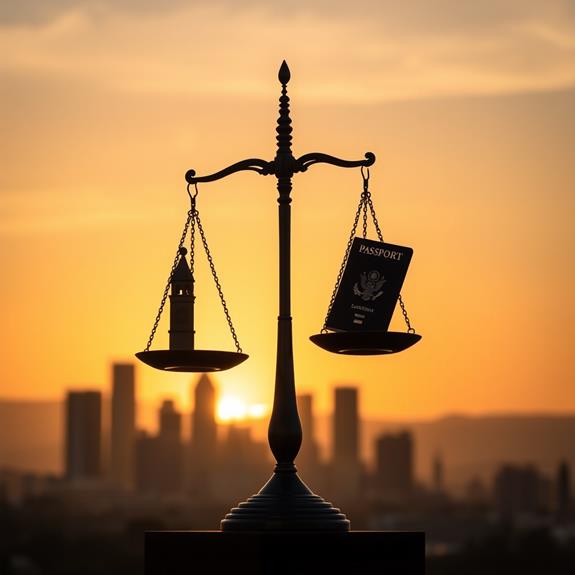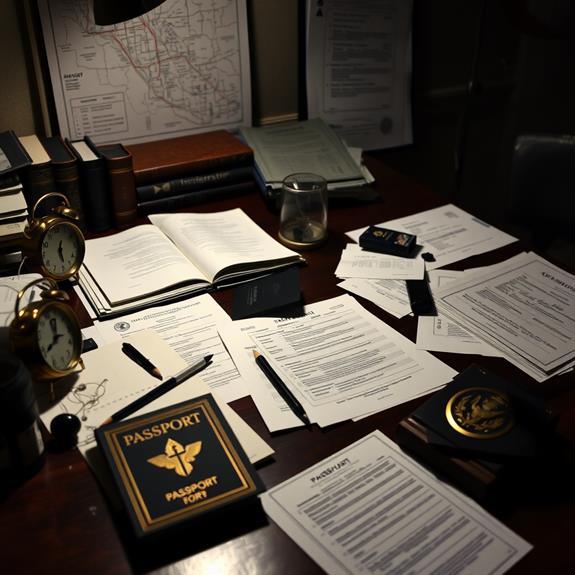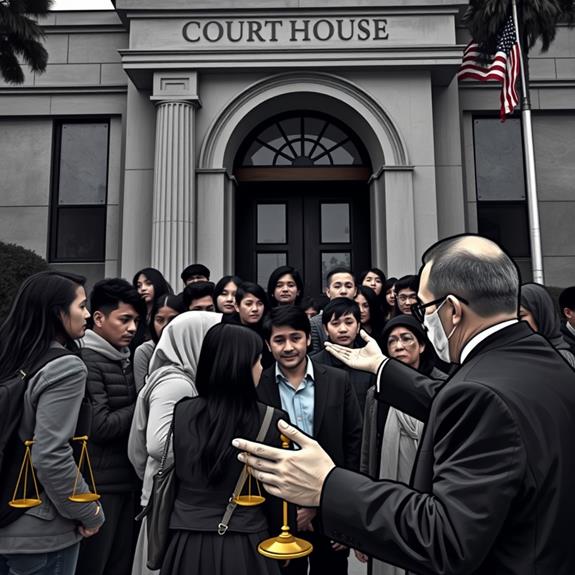If you're seeking legal help for religious persecution asylum in Los Angeles, you'll need to understand the complex application process. You must prove you've faced severe discrimination or harm due to your religious beliefs. The asylum application requires detailed documentation, including personal statements and evidence of persecution. You'll need to file Form I-589 and prepare for an interview with an asylum officer. It's essential to meet deadlines, especially the one-year filing window after arrival in the U.S. Local resources, such as legal aid organizations and community support networks, can provide assistance. Exploring further will reveal more about eligibility criteria and your rights as an asylum seeker.
Understanding Religious Persecution Asylum

What exactly constitutes religious persecution asylum? It's a form of protection granted to individuals who've faced severe discrimination or harm due to their religious beliefs in their home country. This type of asylum is designed to safeguard people who can't return to their homeland without risking further persecution.
Religious persecution can take many forms. It might involve cultural discrimination, where individuals are denied basic rights or opportunities because of their faith. In more extreme cases, it can escalate to faith-based violence, including physical attacks, imprisonment, or even threats to one's life.
To qualify for religious persecution asylum, you must demonstrate that you've experienced or have a well-founded fear of persecution due to your religious beliefs. This persecution must be either carried out by your government or by groups your government is unable or unwilling to control.
It's important to note that not all religious discrimination qualifies as grounds for asylum. The persecution must be severe and ongoing, considerably impacting your ability to practice your faith or live safely in your home country.
Eligibility Criteria for Asylum
In accordance with U.S. immigration law, you must meet specific criteria to be eligible for religious persecution asylum. The asylum eligibility requirements are strict, and you'll need to demonstrate that you qualify under the persecution criteria. Experienced attorneys can provide tailored strategies and extensive guidance through this complex immigration process, ensuring you present the strongest possible case.
To be eligible, you must prove that you've experienced persecution or have a well-founded fear of future persecution in your home country. This persecution must be based on your religion, race, nationality, political opinion, or membership in a particular social group. For religious persecution asylum, you'll need to show that you've been targeted specifically because of your religious beliefs or practices.
You must apply for asylum within one year of arriving in the United States, unless you can prove extraordinary circumstances for the delay. Additionally, you can't have been firmly resettled in another country before coming to the U.S. It's essential to provide evidence supporting your claim, such as documentation of threats, physical harm, or discrimination you've faced. You should also be prepared to explain why you can't safely return to your home country or relocate within it to avoid persecution.
Los Angeles Asylum Application Process

The Los Angeles asylum application process involves several essential steps you'll need to navigate carefully. First, you must file Form I-589, Application for Asylum and for Withholding of Removal, with the U.S. Citizenship and Immigration Services (USCIS). This form requires detailed information about your persecution claim and personal history.
After submitting your application, you'll receive a notice for fingerprinting and a scheduled interview with an asylum officer. During this interview, it's important to provide a clear, consistent account of your experiences. The officer will assess your credibility and evaluate your claim's validity.
Throughout the process, cultural sensitivity plays a significant role. USCIS officers are trained to understand diverse cultural backgrounds and religious practices. They'll consider these factors when reviewing your case.
Additionally, the asylum process incorporates trauma-informed care principles. This approach recognizes the impact of trauma on applicants and aims to create a supportive environment during interviews and proceedings.
If your application is approved, you'll be granted asylum status. However, if denied, you may be referred to an immigration court for further review. It's advisable to seek legal assistance to navigate this complex process effectively.
Required Documentation for Filing
Assembling the required documentation for filing your asylum application is an essential step in the process. You'll need to gather various documents to support your claim of religious persecution. The evidence requirements are specific, and it's vital to follow the documentation checklist provided by the U.S. Citizenship and Immigration Services (USCIS).
Start by collecting personal identification documents, such as your passport, birth certificate, and any national ID cards. You'll also need to provide proof of your religious affiliation and evidence of the persecution you've faced. This can include police reports, medical records, witness statements, and news articles about religious persecution in your home country.
Next, prepare a detailed written statement explaining your experiences and why you're seeking asylum. Include dates, locations, and specific incidents of persecution. Gather any correspondence, such as threatening letters or emails, that support your claim. If possible, obtain expert testimony or reports about religious freedom in your country.
Remember to translate all non-English documents into English and have them certified. Organize your documentation carefully, making copies of everything before submitting. Following these steps will help guarantee a complete and well-supported asylum application.
Preparing for Asylum Interview

Asylum interview preparation is a essential step in your religious persecution case. You'll need to gather all relevant documents, review your case details, and practice interview techniques to guarantee you're ready. It's important to understand the types of questions you might face and how to respond effectively.
To prepare for your asylum interview:
- Review your application thoroughly, making sure all information is accurate and consistent
- Practice answering potential questions with your attorney or a trusted friend
- Prepare to discuss specific incidents of persecution you've experienced in detail
Emotional preparation is also important. The interview may require you to recount traumatic events, so be ready to manage your emotions. Remember, it's okay to take breaks if needed. Your interviewer understands the sensitive nature of these cases.
Be honest and consistent in your responses. If you don't understand a question, ask for clarification. Provide specific dates, names, and locations when possible. Avoid speculation or guessing if you're unsure about certain details. Your credibility is key to a successful asylum claim, so focus on presenting your experiences truthfully and clearly.
Legal Representation in Asylum Cases
When seeking legal representation for your asylum case, you'll need to carefully select an attorney experienced in religious persecution claims. Look for lawyers who've successfully handled similar cases and can provide references or testimonials from past clients. Initial consultation and assessment is essential to evaluate your individual circumstances and identify the grounds for your asylum claim. Your chosen attorney will guide you through case preparation strategies, including gathering evidence, preparing your testimony, and addressing potential challenges to your claim.
Asylum Attorney Selection Process
In light of the complexities surrounding religious persecution asylum cases, choosing the right attorney is essential. When selecting an asylum attorney, you'll want to take into account several key factors. Attorney experience in handling religious persecution cases is vital, as these cases often require specialized knowledge. Look for lawyers who have successfully represented clients with similar claims to yours.
To help you make an informed decision, follow these steps:
- Research potential attorneys' backgrounds and qualifications
- Read client testimonials and reviews from previous asylum seekers
- Schedule consultations with multiple attorneys to assess their expertise
During your search, pay attention to the attorney's communication style and willingness to explain complex legal concepts. You'll want someone who can guide you through the process clearly and patiently. Additionally, examine the attorney's track record of success in asylum cases. Ask about their win rate and any notable outcomes they've achieved for clients facing religious persecution.
Case Preparation Strategies
Once you've selected an experienced asylum attorney, the focus shifts to building a strong case. Your lawyer will guide you through the process of gathering essential case documentation. This includes collecting personal statements, witness testimonies, and expert opinions to support your claim of religious persecution.
Your attorney will help you provide a detailed account of your experiences, emphasizing the cultural context of your situation. They'll also assist in obtaining psychological evaluations, if necessary, to document any trauma you've endured. Gathering information on country conditions is vital, as it helps establish the reality of religious persecution in your home country.
Your lawyer will research relevant legal precedents to strengthen your case. They'll organize all the evidence into a compelling narrative that clearly demonstrates your eligibility for asylum. Throughout this process, your attorney will prepare you for interviews and hearings, ensuring you're ready to present your case effectively.
Timeframes and Deadlines

Understanding the vital timeframes and deadlines for religious persecution asylum cases can make or break your application. It's essential to be aware of the asylum timelines and filing deadlines to guarantee your case is processed smoothly. In the United States, you must generally apply for asylum within one year of your last arrival in the country. However, there are exceptions to this rule if you can demonstrate changed circumstances or extraordinary circumstances.
Once you've filed your application, you'll need to be prepared for several key timeframes:
- Initial interview: Usually scheduled within 45 days of filing
- Decision: Typically issued within 180 days of filing
- Appeal deadline: 30 days from the date of the decision
It's important to note that these timelines can vary depending on your specific case and the current backlog of asylum applications. Working with an experienced immigration attorney can help you navigate these deadlines and guarantee you're meeting all requirements. They'll also assist you in gathering necessary documentation and preparing for interviews within the given timeframes.
Common Challenges and Solutions
Maneuvering the asylum process for religious persecution can be complex, and you'll likely face several challenges along the way. One common issue is overcoming cultural differences. You may struggle to explain your situation to officials who aren't familiar with your home country's customs or religious practices. To address this, work closely with your lawyer to clearly communicate your experiences and provide context for your beliefs.
Language barriers can also complicate your case. If you're not fluent in English, request an interpreter for all interviews and court appearances. This guarantees your story is accurately conveyed. Another hurdle is gathering sufficient evidence to support your claim. Collect any documents, photos, or witness statements that prove your religious persecution. Your attorney can help you identify relevant evidence.
Mental health challenges often arise during the asylum process. The stress of reliving traumatic experiences can be overwhelming. Seek counseling or support groups to help you cope. Additionally, be prepared for long wait times and potential delays. Stay patient and maintain regular contact with your lawyer to track your case's progress. With persistence and proper guidance, you can navigate these challenges successfully.
Rights of Asylum Seekers

While seeking asylum for religious persecution, you're entitled to certain fundamental rights. These asylum rights protect you during the application process and guarantee fair treatment. It's essential to understand these rights as you navigate your persecution claims.
Your basic rights as an asylum seeker include:
- The right to remain in the country while your case is pending
- The right to legal representation (at your own expense)
- The right to a fair hearing and appeal process
You have the right to work in the U.S. if your asylum application has been pending for 150 days or more. This allows you to support yourself while waiting for a decision. You're also entitled to emergency medical care and can apply for certain public benefits.
It's important to know that you can't be deported while your asylum case is ongoing. You have the right to present evidence and witnesses to support your claim. If your initial application is denied, you can appeal the decision. Understanding these rights empowers you to advocate for yourself effectively throughout the asylum process.
Local Resources for Asylum Applicants
When you're seeking asylum due to religious persecution, local resources can be invaluable. Legal aid organizations in your area may offer free or low-cost assistance with your asylum application and court proceedings. Community support networks, including faith-based groups and immigrant advocacy organizations, can provide guidance, emotional support, and help with practical needs during your asylum process.
Legal Aid Organizations
Numerous legal aid organizations across the United States offer essential support to asylum seekers fleeing religious persecution. These organizations provide free or low-cost legal services to help you navigate the complex asylum process. They're staffed by experienced attorneys and advocates who understand the unique challenges faced by those seeking protection from religious persecution.
When looking for legal aid, consider these key factors:
- Expertise in religious persecution cases
- Familiarity with asylum laws and procedures
- Track record of successful asylum applications
Many legal aid organizations also offer advocacy services beyond direct legal representation. They can help you access social services, find housing, and connect with support groups. These resources are vital for your overall well-being during the asylum process.
To find a reputable legal aid organization, start by contacting local immigrant rights groups or religious institutions. They often have connections to trusted legal services providers. You can also search online directories of nonprofit immigration attorneys. Remember, it's important to work with accredited organizations to guarantee you receive reliable assistance throughout your asylum journey.
Community Support Networks
Beyond legal assistance, community support networks play an essential role in helping asylum seekers adjust to their new lives. These networks often include local organizations, religious institutions, and grassroots groups that provide various services and resources.
Community outreach programs can help you connect with essential services like housing, healthcare, and education. They may also offer language classes, job training, and cultural orientation programs to ease your adjustment. Support groups are another valuable resource, providing a safe space to share experiences and build relationships with others facing similar challenges.
You'll find that many community centers and faith-based organizations host regular meetings and events for asylum seekers. These gatherings can be a great way to meet people, learn about local resources, and get emotional support. Some groups also offer mentorship programs, pairing you with a local volunteer who can guide you through daily life in your new community.

